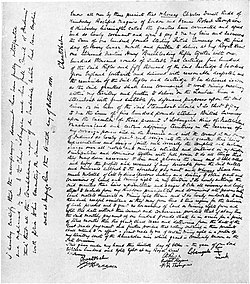Rudd Concession

A photograph of the concession document
|
|
| Signed | 30 October 1888 |
|---|---|
| Location | Bulawayo, Matabeleland |
| Depositary | British South Africa Company (from 1890) |
|
|
|
The Rudd Concession, a written concession for exclusive mining rights in Matabeleland, Mashonaland and other adjoining territories in what is today Zimbabwe, was granted by King Lobengula of Matabeleland to Charles Rudd, James Rochfort Maguire and Francis Thompson, three agents acting on behalf of the South African-based politician and businessman Cecil Rhodes, on 30 October 1888. Despite Lobengula's retrospective attempts to disavow it, it proved the foundation for the royal charter granted by the United Kingdom to Rhodes's British South Africa Company in October 1889, and thereafter for the Pioneer Column's occupation of Mashonaland in 1890, which marked the beginning of white settlement, administration and development in the country that eventually became Rhodesia, named after Rhodes, in 1895.
Rhodes's pursuit of the exclusive mining rights in Matabeleland, Mashonaland and the surrounding areas was motivated by his wish to annex them into the British Empire as part of his personal ambition for a Cape to Cairo Railway—winning the concession would enable him to gain a royal charter from the British government for a chartered company, empowered to annex and thereafter govern the Zambezi–Limpopo watershed on Britain's behalf. He laid the groundwork for concession negotiations during early 1888 by arranging a treaty of friendship between the British and Matabele peoples and then sent Rudd's team from South Africa to obtain the rights. Rudd succeeded following a race to the Matabele capital Bulawayo against Edward Arthur Maund, a bidding-rival employed by a London-based syndicate, and after long negotiations with the king and his council of izinDuna (tribal leaders).
...
Wikipedia
